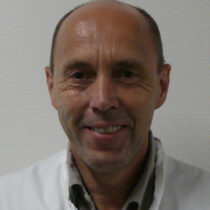Universitätsklinikum Gießen und Marburg
Area Of expertise and the Healthcare Provider’s contribution to care for patients within the MetabERN Network
The healthcare provider (Andreas Hahn) performs enzyme replacement therapies in about 30 patients with different lysosomal storage disorders. We collect data of all patients with infantile Pompe disease in Germany. We also assessed data about 35 patients with juvenile Pompe disease in Germany. In conjunction with other experts, we developed recommendations and developed guidelines for diagnostics and treatment of these two patient groups. We facilitate data transfer and the spreading of new knowledge between single centres and single medicins taking care of these patients.
The healthcare provider is a member of the scientific board of the German self-help group for Pompe disease and collaborates with this group. We are organising national studies and taking part in multinational studies concerning infantile and juvenile Pompe disease. The healthcare provider is also a member of the European Pompe Consortium (EPOC) and therefore is embedded in multinational studies and the development of European guidelines in Pompe disease.
Collectively, we will specifically try to ameliorate the treatment of patients with Pompe disease within the network.
Specific Treatments and interventions provided by the HCP
The healthcare provider (Department of Child Neurology) consists of a Social-Pediatric Centre and a neuropediatric ward. We can perform ERT in our department to offer social care services, physiotherapy, ergotherapy and speech therapy. We can also do diagnostic procedures such as MRI, blood taking, lumbar puncture, muscle and skin biopsy, and enzyme determination. We have access to an intensive care unit, which allows us to manage acute exacerbations of the disease or severe treatment side effects and initiate home ventilation. As part of a university hospital, we have close collaborations with Neuropathology, Neuroradiology, cardiology, and our Institute of Human Genetics. We can also offer palliative treatment supporting patients and families during the terminal phase of an illness. The centre is involved an entire chain of care for newborn screening on fatty acid oxidation disorders. Based on studies performed by the centre, the Dutch newborn screening program has been adapted. Furthermore, national guidelines are developed and maintained to ensure optimal follow-up and treatment after an initial newborn screening result indicative of a fatty acid oxidation disorder.
The CIMD-UMCU closely collaborates with the genetic department in which the laboratory for metabolic diseases is embedded, which guarantees state of the art facilities for research and opens the way to detecting novel metabolic defects and unravelling metabolic pathways.

Universitätsklinikum Gießen und Marburg
Feulgenstraße 10-12, Gießen, Germania


